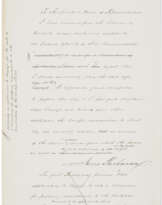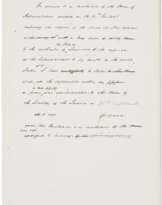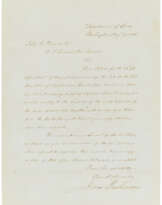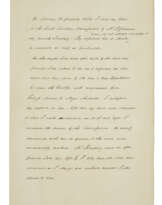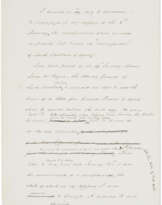ID 1472044
Los 122 | Drafts of his manuscripts on the right of secession
Schätzwert
$ 40 000 – 60 000
18 pages, ranging in size from 175 x 205 to 345 x 212mm, primarily single sheets with two bifolia (occasional contemporary ink marks, some toned stains on verso). 11 pages in Buchanan's hand and seven in an unidentified hand.
Important, unpublished draft remarks defending his management of the Secession Crisis and a categorical attack on the right of any state to secede from the Union citing the words of James Madison. A revealing series of remarks in which Buchanan attempts to justify his conduct the southern states seceded from the Union: "I adopted the course which I have pursued from deep conviction & after much careful deliberation. It was the only course which could have prevented immediate collision & the commencement of civil war. Compared with this A war with the most powerful foreign nation in the world be a blessing. In this we have ever been ready & willing to engage when demanded by the interest & honor of the nation. A civil war in which we should embrace our hands in each others blood would be a calamity in which no man can decide whether the North or the South would suffer." The closest precedent he could reference for such a calamity was the English Civil War that dragged on for eleven years: "The ruthless character of such a war & its long continuance are demonstrated in the civil war of the country from which we derive our origin. Every war must eventually terminate in peace. Why not conclude with our brethren before active hostilities commence?" Back on the defensive, he writes that he hopes that he had offered "abundant evidence in my past conduct that I can & will do everything that is possible, consistently which the duties which I owe to my country as President of the United States to prevent the commencement of a civil war…. The existing complications respecting the forts in the harbor of Charleston could not have been foreseen by any human vision. It is our duty, under Providence, to act in such a manner as to preserve the peace of the Country & not to institute a war which may at last involve all the States, not upon any great or general principle but about the possession of a single fort which each of the parties claims to be its property…"
And while Buchanan counseled peace, he refused to recognize the right of any state to secede from the Union, noting "we hold divided opinions on the great question whether each of the states possesses the Constitutional or reserved right to withdraw from the Union without the consent of her Sister States. On this question I have nothing to add to the arguments against the existence of such a power except an authority of the highest character. After the Constitution had been framed by the Convention & whilst the question of its ratification was pending before the Convention of New York, General Hamilton, its leading member, addressed a letter to Mr. Madison in July 1788 to ascertain whether it would be possible for New York to enter the Union with a 'reservation of the right to secede from it under certain conditions…. The Answer of Mr. Madison on the next day was clear and explicit." The Virginian (and slaveholder) wrote: "'The Constitution requires an adoption in toto and forever.'" Buchanan then notes that other states had adopted it in the same manner, warning that an "an adoption for a limited time would be as defective as an adoption of some of the articles only. … 'The idea of reserving a right to withdraw was started at Richmond & considered a conditional ratification which was itself abandoned as worse a rejection." His thoughts continue on another page (and in this instance, in an unidentified hand): "In order to justify secession as a constitutional remedy, it must be on the principle that the Federal Government is a mere voluntary association of States to be dissolved at pleasure by any one of the contracting parties. If this be so the confederacy is a rope of sand to be penetrated and dissolved by the first adverse wave of public opinion in any of the States — In this manner, our thirty three States, may resolve themselves into as many petty, jarring and hostile Republics, each one retiring form the Union without responsibility, whenever any sudden excitement might cause exit, and the State is relived from all obligations of the Federal Constitution." Although Buchanan did not recognize the right of states to secede, Buchanan, did not believe it his role to spark a civil war. That decision, he felt, should be left to the incoming administration.
| Künstler: | James Buchanan (1791 - 1868) |
|---|---|
| Herkunftsort: | Vereinigte Staaten |
| Kategorie des Auktionshauses: | Briefe, Dokumente und Manuskripte |
| Künstler: | James Buchanan (1791 - 1868) |
|---|---|
| Herkunftsort: | Vereinigte Staaten |
| Kategorie des Auktionshauses: | Briefe, Dokumente und Manuskripte |
| Adresse der Versteigerung |
CHRISTIE'S 8 King Street, St. James's SW1Y 6QT London Vereinigtes Königreich | |
|---|---|---|
| Vorschau |
| |
| Telefon | +44 (0)20 7839 9060 | |
| Aufgeld | see on Website | |
| Nutzungsbedingungen | Nutzungsbedingungen |





